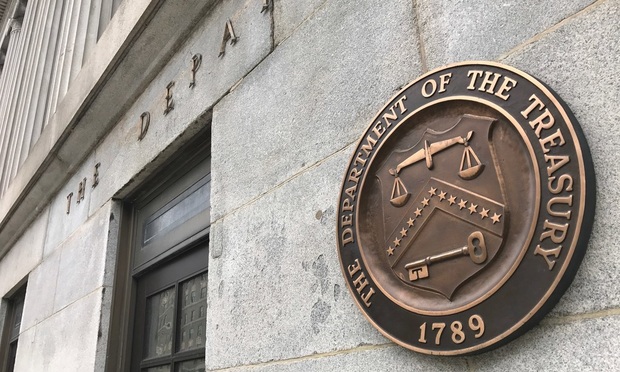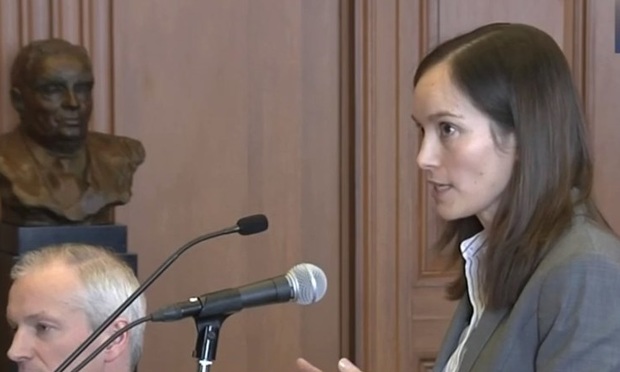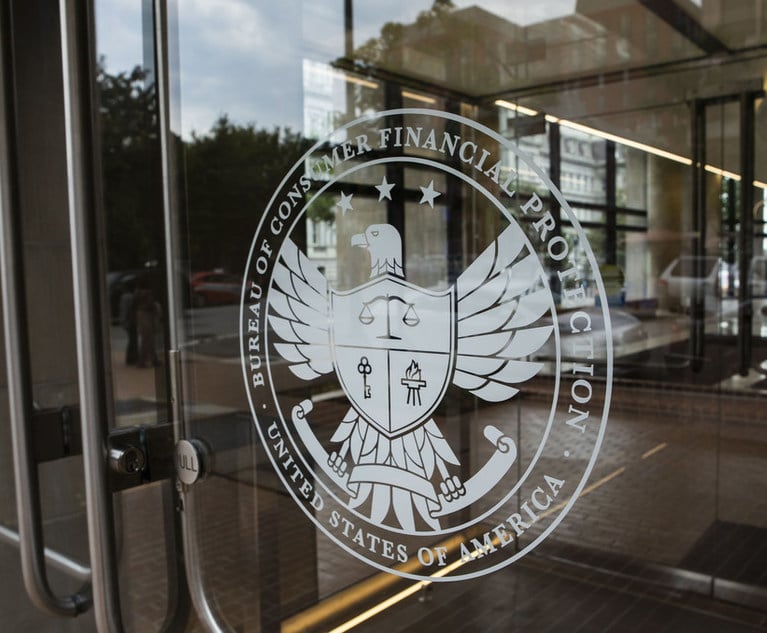A Judge Didn't Sound Eager to Throw Out House Suit Seeking Trump Tax Returns
U.S. District Judge Trevor McFadden said there is a "strong line of cases suggesting the House would have standing to bring this type of case."
November 06, 2019 at 02:04 PM
5 minute read
 U.S. Treasury Department in Washington. Credit: Mike Scarcella
U.S. Treasury Department in Washington. Credit: Mike Scarcella
A federal judge in Washington appeared reluctant Wednesday to dismiss a House lawsuit seeking President Donald Trump's tax returns, saying he was skeptical of the Justice Department's arguments that courts lack jurisdiction to resolve disputes between Congress and the president.
U.S. District Judge Trevor McFadden of the District of Columbia said there is a "strong line of cases suggesting the House would have standing to bring this type of case." McFadden, a former Baker McKenzie partner who joined the trial bench in 2017, said he believed he "probably" does have jurisdiction over the interbranch dispute.
McFadden's early commentary did little to deter Justice Department lawyer James Burnham, a former Trump White House lawyer, who argued that Congress has tools aside from a federal lawsuit to "wring" information out of the executive branch. Among other things, he said, Congress could leverage the appropriations or nominations processes to extract information.
Burnham, a top political appointee in the Justice Department's civil division, said it would become "politically costless" for Congress to demand information from the executive branch if it were allowed to run to court to enforce those investigative requests. A decision allowing the House to resolve standoffs in court—as opposed to negotiations with a presidential administration—would cause a "major revolution in the way the branches interact with each other" and give rise to a flood of lawsuits from Congress, Burnham argued.
"They'll be flying around everywhere," Burnham said.
House lawyer Megan Barbero rejected the notion that Congress in the future would more regularly run to the courts rather than engage in the so-called accommodation process with the executive branch. In the case of Trump's federal tax returns, she said, the House sued because those records are of "great importance" to the Ways and Means Committee.
 Megan Barbero. Screen grab from C-SPAN
Megan Barbero. Screen grab from C-SPANBarbero said the Trump administration has displayed an "unprecedented refusal" to comply with congressional demands for information. Trump's administration, she said, has engaged in an "unprecedented level of obstruction in terms of non-responsiveness to subpoenas."
Barbero also pointed to a federal law dictating that the Treasury Department "shall" turn over the tax returns of any private citizen at the committee's request. Lawyers for the Treasury Department and Justice Department have argued that the committee lacks a valid reason for reviewing Trump's tax returns.
As the hearing concluded, McFadden said he wanted to be "careful about treading" in an interbranch dispute, saying he was "worried about creating case law that last well beyond this case that may or may not be wrong." He urged the House to consider tailoring its lawsuit down to only its most "viable claims."
"In this type of area," he said, "it might be wise."
Wednesday's hearing unfolded down the hall from the courtroom where former Trump campaign adviser Roger Stone is standing trial on charges he lied to Congress. "If you're here for the Roger Stone trial," McFadden said at the beginning of the hearing, "you're in the wrong courtroom."
The court action came four months after House Democrats sued the Trump administration, arguing that the Treasury Department was unlawfully declining to turn over six years of the president's federal tax returns to the Ways and Means Committee.
The case is just one front in a broader dispute between House Democrats and Trump over access to his financial information.
Weeks after the House sued the Treasury Department, Trump's personal lawyer preemptively sued the House and New York state government, seeking to prevent congressional Democrats from obtaining the president's state tax returns under a newly passed law designed to enable access to those records.
Separately, the U.S. Court of Appeals for the D.C. Circuit said in October that Trump's longtime accountant, Mazars USA, must comply with a House Oversight Committee subpoena for financial records. Trump's lawyers, led by William Consovoy of Washington's Consovoy McCarthy, are weighing a further challenge of that order, including possibly taking the case to the U.S. Supreme Court.
Meanwhile, the Second Circuit in New York this week ruled that Mazars must respond to a grand jury subpoena issued by New York District Attorney Cyrus Vance. Vance's office, seeking copies of Trump's tax returns, is investigating hush-money payments made to two women in the lead-up to the 2016 presidential election. The women allege they had consensual sexual relationships with Trump, who has denied the affairs.
The Second Circuit rejected arguments from Trump's lawyers that the president enjoys immunity from investigation. That case is expected to reach the Supreme Court in the next several days.
Trump has long resisted revealing his tax returns, despite a pledge as a candidate that he wanted to do so. Trump was the first president in modern history to not voluntarily release his returns as a candidate.
Read more:
'Let's Motor Through, Chairman': How Robert Luskin Guided Gordon Sondland
Who Is Trevor McFadden? Meet the Judge Assigned the Trump Tax Returns Case
16 Conservative Lawyers Say They Support 'Expeditious' Impeachment Inquiry
READ: US House Asks Judge to Force Disclosure of Trump's Taxes
This content has been archived. It is available through our partners, LexisNexis® and Bloomberg Law.
To view this content, please continue to their sites.
Not a Lexis Subscriber?
Subscribe Now
Not a Bloomberg Law Subscriber?
Subscribe Now
NOT FOR REPRINT
© 2025 ALM Global, LLC, All Rights Reserved. Request academic re-use from www.copyright.com. All other uses, submit a request to [email protected]. For more information visit Asset & Logo Licensing.
You Might Like
View All
CFPB Resolves Flurry of Enforcement Actions in Biden's Final Week

Wells Fargo and Bank of America Agree to Pay Combined $60 Million to Settle SEC Probe

Supreme Court May Limit Federal Prosecutions Over 'Misleading' but True Statements
Trending Stories
- 1New York-Based Skadden Team Joins White & Case Group in Mexico City for Citigroup Demerger
- 2No Two Wildfires Alike: Lawyers Take Different Legal Strategies in California
- 3Poop-Themed Dog Toy OK as Parody, but Still Tarnished Jack Daniel’s Brand, Court Says
- 4Meet the New President of NY's Association of Trial Court Jurists
- 5Lawyers' Phones Are Ringing: What Should Employers Do If ICE Raids Their Business?
Who Got The Work
J. Brugh Lower of Gibbons has entered an appearance for industrial equipment supplier Devco Corporation in a pending trademark infringement lawsuit. The suit, accusing the defendant of selling knock-off Graco products, was filed Dec. 18 in New Jersey District Court by Rivkin Radler on behalf of Graco Inc. and Graco Minnesota. The case, assigned to U.S. District Judge Zahid N. Quraishi, is 3:24-cv-11294, Graco Inc. et al v. Devco Corporation.
Who Got The Work
Rebecca Maller-Stein and Kent A. Yalowitz of Arnold & Porter Kaye Scholer have entered their appearances for Hanaco Venture Capital and its executives, Lior Prosor and David Frankel, in a pending securities lawsuit. The action, filed on Dec. 24 in New York Southern District Court by Zell, Aron & Co. on behalf of Goldeneye Advisors, accuses the defendants of negligently and fraudulently managing the plaintiff's $1 million investment. The case, assigned to U.S. District Judge Vernon S. Broderick, is 1:24-cv-09918, Goldeneye Advisors, LLC v. Hanaco Venture Capital, Ltd. et al.
Who Got The Work
Attorneys from A&O Shearman has stepped in as defense counsel for Toronto-Dominion Bank and other defendants in a pending securities class action. The suit, filed Dec. 11 in New York Southern District Court by Bleichmar Fonti & Auld, accuses the defendants of concealing the bank's 'pervasive' deficiencies in regards to its compliance with the Bank Secrecy Act and the quality of its anti-money laundering controls. The case, assigned to U.S. District Judge Arun Subramanian, is 1:24-cv-09445, Gonzalez v. The Toronto-Dominion Bank et al.
Who Got The Work
Crown Castle International, a Pennsylvania company providing shared communications infrastructure, has turned to Luke D. Wolf of Gordon Rees Scully Mansukhani to fend off a pending breach-of-contract lawsuit. The court action, filed Nov. 25 in Michigan Eastern District Court by Hooper Hathaway PC on behalf of The Town Residences LLC, accuses Crown Castle of failing to transfer approximately $30,000 in utility payments from T-Mobile in breach of a roof-top lease and assignment agreement. The case, assigned to U.S. District Judge Susan K. Declercq, is 2:24-cv-13131, The Town Residences LLC v. T-Mobile US, Inc. et al.
Who Got The Work
Wilfred P. Coronato and Daniel M. Schwartz of McCarter & English have stepped in as defense counsel to Electrolux Home Products Inc. in a pending product liability lawsuit. The court action, filed Nov. 26 in New York Eastern District Court by Poulos Lopiccolo PC and Nagel Rice LLP on behalf of David Stern, alleges that the defendant's refrigerators’ drawers and shelving repeatedly break and fall apart within months after purchase. The case, assigned to U.S. District Judge Joan M. Azrack, is 2:24-cv-08204, Stern v. Electrolux Home Products, Inc.
Featured Firms
Law Offices of Gary Martin Hays & Associates, P.C.
(470) 294-1674
Law Offices of Mark E. Salomone
(857) 444-6468
Smith & Hassler
(713) 739-1250









